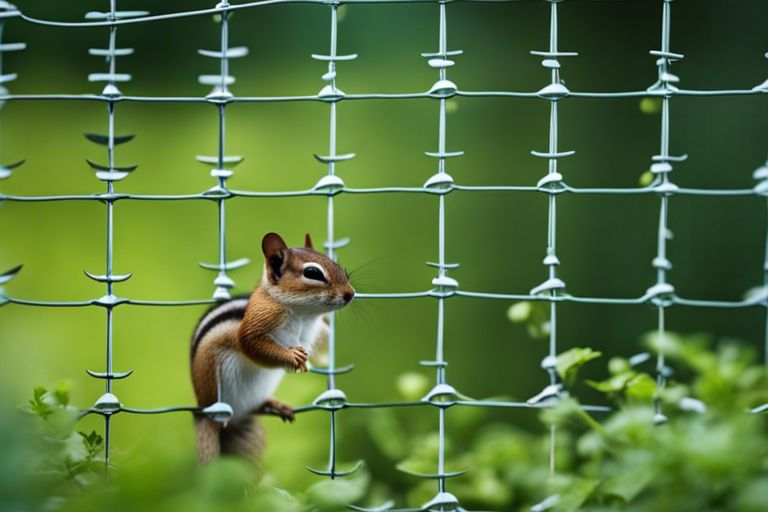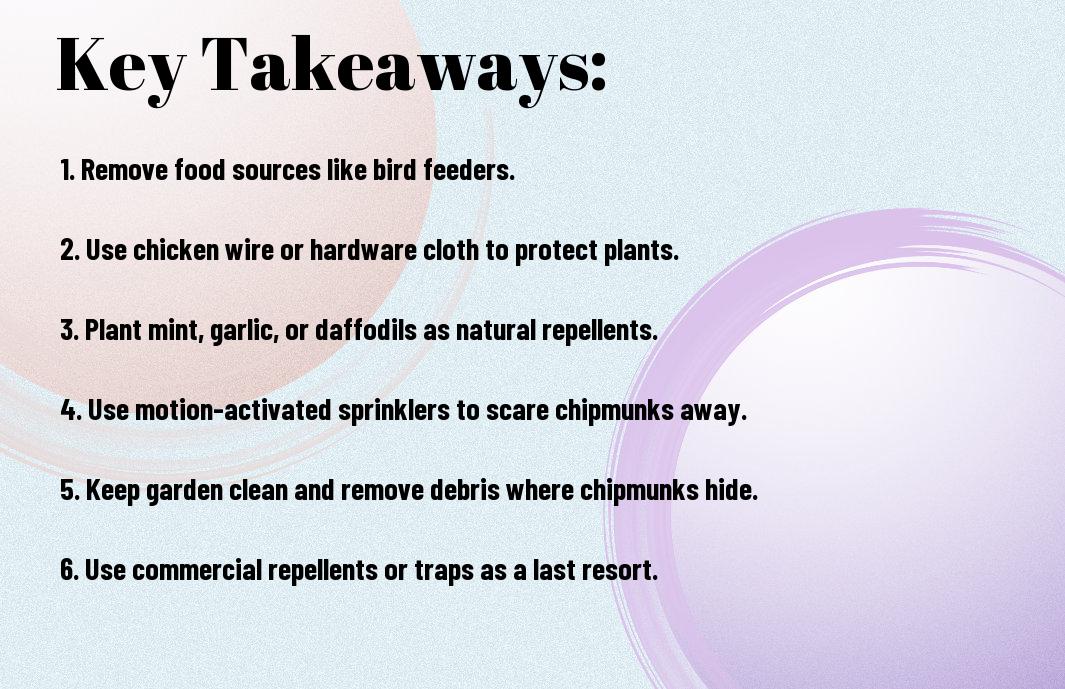There’s a charming critter that can wreak havoc in your garden—the chipmunk. These curious little creatures may be cute, but their penchant for digging up bulbs and munching on tender plants can quickly turn them into garden pests. In this blog post, we will explore natural and humane ways to deter chipmunks from causing chaos in your garden, allowing both your plants and furry friends to coexist harmoniously.
Key Takeaways:
- Implement physical barriers: Use fences, wire mesh, or netting to keep chipmunks out of your garden and protect your plants.
- Repel with natural deterrents: Try using garlic, cayenne pepper, or predator urine to deter chipmunks from entering your garden.
- Maintain a tidy garden: Keep your garden clean and free of clutter to reduce hiding spots for chipmunks and make it less attractive to them.

Identifying the Problem
Why Chipmunks Are Attracted to Your Garden
One of the main reasons chipmunks are attracted to your garden is the abundance of readily available food sources such as fruits, nuts, seeds, and flower bulbs. Chipmunks are opportunistic feeders and will be drawn to areas where they can easily find these tasty treats.
The Damage They Can Cause
Attracted by the appealing food options in your garden, chipmunks can wreak havoc on your plants and landscaping. These small creatures can dig up bulbs, eat fruits and vegetables, and gnaw on tree bark. Their activities can result in damage to your garden that can be frustrating and costly to repair.
With their burrowing habits, chipmunks can also disturb the roots of plants and create holes in the ground, posing a tripping hazard and potentially damaging the structural integrity of walkways and patios.
Deterrent Methods
Physical Barriers: Fencing and Netting
Now, for physical barriers like fencing and netting, they can be highly effective in keeping chipmunks out of your garden. Make sure to bury the fencing a few inches below the ground to prevent them from burrowing underneath. Netting can be draped over plants to deter chipmunks from snacking on your vegetables and fruits.
Repellents: Sprays, Granules, and Other Options
Methods like repellent sprays and granules can be useful in deterring chipmunks from your garden. There are various options available, from natural ingredients like peppermint oil to commercial repellents designed specifically for chipmunks. Place these repellents strategically around your garden to create a barrier that chipmunks will want to avoid.
For additional effectiveness, consider rotating different types of repellents to prevent chipmunks from getting accustomed to a single scent or taste.
Physical barriers and repellents can work hand in hand to create a strong defense against chipmunks in your garden. By combining these methods and staying consistent with their application, you can enjoy a chipmunk-free garden and protect your plants from these curious critters.
Habitat Modification
All animals, including chipmunks, seek out habitats that provide the necessary resources for survival. By modifying your garden environment, you can make it less appealing to chipmunks and deter them from making it their home.
Removing Attractants: Food and Shelter
To discourage chipmunks from taking up residence in your garden, eliminate potential food sources such as fallen fruits, seeds, and nuts. Keep your garden tidy and free of clutter that could provide shelter for these small rodents. By removing these attractants, you can make your garden less inviting to chipmunks.
Creating Uninviting Conditions
Modification of the habitat can involve techniques like reducing water sources, keeping vegetation trimmed, and using mulch that is less attractive to chipmunks. Making your garden less hospitable to chipmunks can help deter them from setting up nests and foraging in your plants.
With a few simple changes to your garden environment, you can create a space that is less appealing to chipmunks, encouraging them to seek food and shelter elsewhere.

Summing up
The article “How Do I Keep Chipmunks Out Of My Garden?” serves as a comprehensive guide on protecting your garden from chipmunk damage. By implementing various humane tactics such as exclusion methods, repellents, and creating an unwelcoming environment, gardeners can coexist peacefully with chipmunks while safeguarding their plants. Observing nature’s balance and respecting wildlife’s presence can lead to a harmonious and sustainable garden ecosystem.
FAQ
Q: Why are chipmunks a problem in my garden?
A: Chipmunks are known to dig up bulbs, eat newly planted seeds, and munch on fruits and vegetables in gardens, causing damage to plants.
Q: What are some natural ways to keep chipmunks out of my garden?
A: Planting garlic, daffodils, or marigolds around the garden can act as a natural deterrent to chipmunks. Additionally, using cayenne pepper or predator urine can help keep them away.
Q: How can I protect my garden beds from chipmunks?
A: To protect your garden beds, you can install physical barriers like fences or mesh wire around the perimeter. Raised garden beds can also make it harder for chipmunks to access your plants.
Q: Are there any humane ways to discourage chipmunks from entering my garden?
A: Yes, you can try using motion-activated sprinklers or ultrasonic devices that emit sound waves to deter chipmunks without causing them harm.
Q: What should I do if I have a persistent chipmunk problem in my garden?
A: If chipmunks continue to be a nuisance despite your efforts, you may need to consider trapping them using live traps and then releasing them in a suitable wooded area far from your garden.
